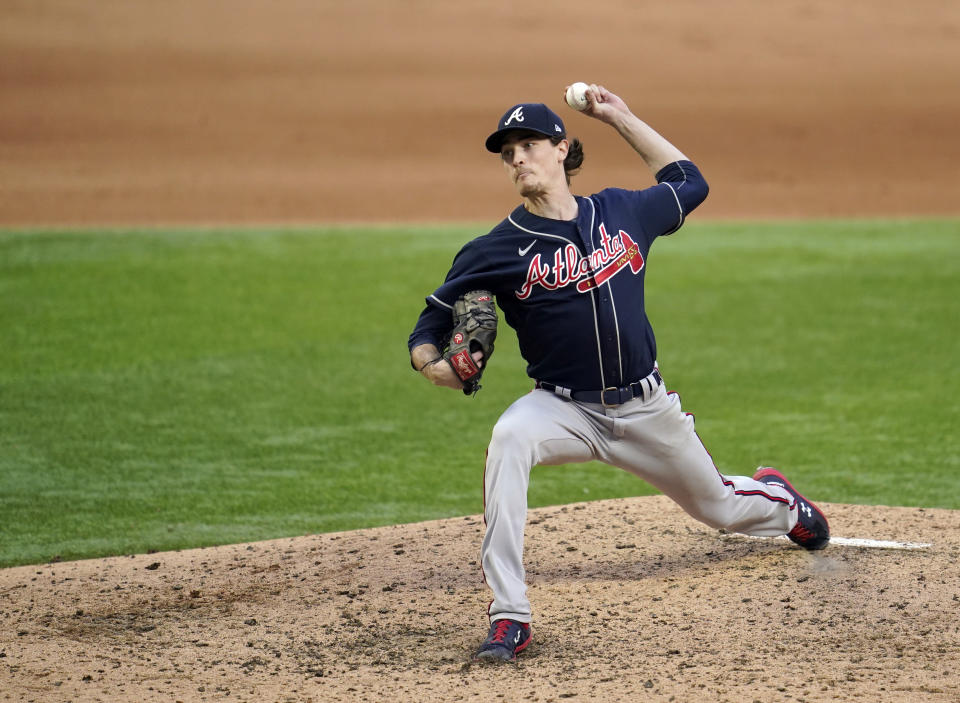Max Fried lost NLCS Game 6, but his resilience may set the Braves up to win Game 7
The most valuable Braves player in a 3-1 NLCS loss to the Los Angeles Dodgers that forced a Game 7 was the pitcher who gave up all three runs.
Before the game, manager Brian Snitker conceded that hitters would have the advantage as both teams brought back their Game 1 starters for a second look at these powerful lineups, the top two teams in runs scored during the regular season.
Walker Buehler apparently didn’t get the memo. It took him only eight pitches to sit the first three Braves batters down in order.
After his first eight pitches, Max Fried had put the team in a two-run hole, giving up back-to-back solo shots to Corey Seager — his fifth of the series and sixth of the postseason — and Justin Turner. Another run scored on a walk and a couple of hits. After going up 3-1 in the series, the Braves were down 0-3 in a game where a win would send them to their first World Series since 1999.
“Obviously we said going in Max needed to stretch the game for us, he needed to pitch,” Snitker said.
The Braves used six pitchers in a Game 5 loss on Friday night. A.J. Minter started and went the furthest, throwing three innings in a bullpen game. Among the many sacrifices to an expanded schedule and neutral sites this postseason have been the usual off days in the Division Series and Championship Series. The depth and talent and current tiredness of a team’s bullpen has increasingly been among the most significant factors determining a team’s October success. Now, as teams prepare to play up to seven games in seven days, full bullpen starts have become the norm and in-game analysis hinges on how many innings each available arm might have left. The regular season may have been a relative sprint this year, but the playoffs are a slog that rewards resilience.
Atlanta was counting on Fried, who had thrown seven scoreless innings in the first game of the postseason, to be the ace that bought their bullpen a day off.
“But,” Snitker said, “a lot of those conversations are good in the morning, and then the game starts and you’re not gonna let somebody hang themselves.”

So with three runs in and only one out in the game, Snitker called down to the bullpen. Jacob Webb started warming. Balancing the tension between living for today and planning for tomorrow is a manager’s main role in October. That and mitigating the damage done in a loss. But Snitker held back and Fried got a couple of fly outs to end the inning. Webb sat down.
Fried gave up 14 runs in the 60-game regular season — six in the first inning and eight in all the other innings combined.
At that point, the Braves were still in it. Eight innings to go and only three runs to make up. For a team with baseball’s highest OPS and all the motivation in the world, that should have been surmountable.
In the bottom of the second they failed to capitalize after loading the bases with no outs. It was their last best chance. They failed to score off Buehler and managed one run off the Dodgers’ similarly taxed and oft anxiety-inducing bullpen.
“You got to give credit where credit's due and they got really good pitchers over there,” Snitker said. “You know you're bringing guys out of the bullpen with 100 mph sinkers, that's kind of hard to get ahold of.”
So no, they didn’t come back. They didn’t bail out Fried, who was barely audible over the Zoom microphone after the game, mumbling about how he wasn’t good enough.
And OK, technically that’s true. But if you take away a comparative aspect — “enough” — Fried was good. Very good, even.
The Dodgers didn’t score again. Fried outlasted Buehler, who had outpitched him. He finally left in the seventh inning after throwing a 95 mph four-seam fastball for his 109th pitch, topping his previous career high of 103.
Snitker, apparently, wasn’t all that worried about the pitch count.
“I’m blown away that that’s your career high,” he told Fried after the game.
“One hundred and forty ought to be a career high, not 107 or 108,” he told reporters, grumbling about the tendency to view the century mark as an upper limit and locking down the dad voting bloc for manager of the year.
But starters don’t throw 140 pitches anymore. Twenty-two-year-old rookie Ian Anderson hasn’t, anyway, and that’s who Snitker will hand the ball to for a win-or-go-home Game 7. His career high in the majors is 104. He threw 106 in a Double-A game last year, his most in affiliated ball.
Losing by two runs costs you the same in the series and the season as losing by 12. But when you have one more game left to make the grind that was this year worth it, it helps to have a well-rested bullpen.
Ultimately, all the arms in the world are only as good as the run support they get. The Braves feel better going into Sunday than they would if the bullpen had been tapped for a lengthy loss on Saturday. They feel good cause they like Anderson’s demeanor in big spots and because what else are you going to say on the eve of a Game 7 you never wanted to have to play?
Fried battled back to put his team in a decent position to win the next night without him. Now they just have to do so.
More from Yahoo Sports:

 Yahoo Sport
Yahoo Sport 






































